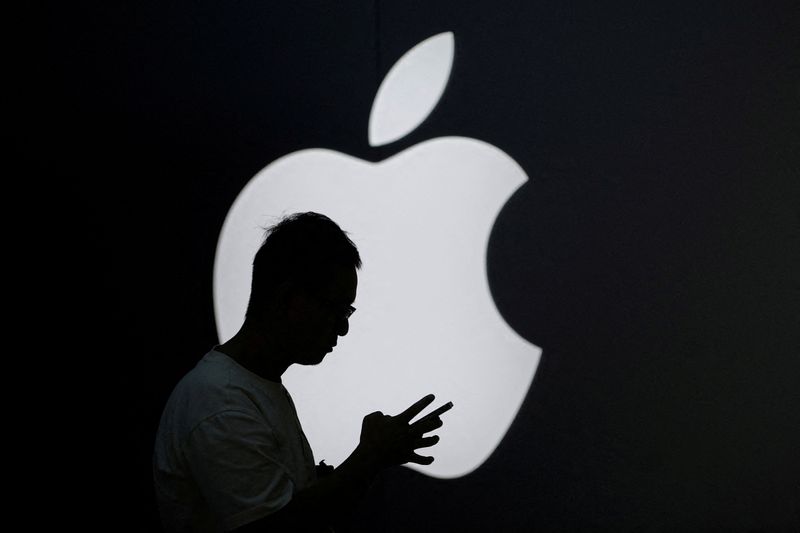By Lewis Krauskopf
NEW YORK (Reuters) – High noon is approaching for the market’s biggest stocks, as pressure grows on richly valued technology and growth companies to deliver robust earnings at a time when sky-high bond yields threaten to dull the allure of equities.
Huge rallies for the so-called “Magnificent Seven” stocks – Apple, Microsoft, Alphabet, Amazon, Nvidia, Tesla and Meta Platforms – have driven nearly all of the S&P 500’s 12% year-to-gain because of their outsized weighting in the index.
That stellar performance has also raised the stakes in the upcoming earnings season. Valuations have swelled, with the Magnificent Seven trading at an average forward price-to-earnings ratio of 33.5, compared with the S&P 500’s P/E of 18.3.
At the same time, Treasury yields at 16-year highs are providing investment competition to stocks. With U.S. government bonds now offering risk-free yields of around 5% or more, investors may be less forgiving of companies which are unable to deliver strong results.
That appeared to be the case for Tesla, the first of the megacaps to report results this period. Shares of Tesla were down 7% on Thursday morning after the electric vehicle maker missed Wall Street estimates on third-quarter gross margin, profit and revenue.
“Everybody knows these guys are going to make money,” said Sameer Samana, senior global market strategist at the Wells Fargo Investment Institute (WFII), referring to the Magnificent Seven. “The only question is how fast is that earnings growth, and have investors overpaid for it.”
The Wells Fargo Investment Institute in June downgraded its rating on the information technology sector — which includes Apple, Microsoft and Nvidia — to “neutral” from “favorable.”
Results from Microsoft, Google-parent Alphabet, Amazon and Facebook-parent Meta are expected next week, while Apple and Nvidia are set to report next month.
In aggregate, the megacap companies are expected to post a 32.8% gain in earnings in 2023, while the rest of the S&P 500 sees a 2.3% decline, according to Tajinder Dhillon, senior research analyst at LSEG.
Complicating the outlook is the relentless climb in interest rates and Treasury yields, which has been driven by a mix of Federal Reserve hawkishness in the face of a strong economy and worries over the U.S. fiscal picture.
Growth and tech companies are seen as being more vulnerable to higher yields, as their typically robust projected future cash flows are valued less highly when investors can earn more from risk-free government bonds.
The yield on the benchmark 10-year Treasury recently stood at 4.94%, its highest since July 2007.
“People have got choices that they didn’t have and they will allocate differently,” said Tim Pagliara, chairman and chief investment officer at CapWealth. “The reallocation of funds going forward is going to suggest lower returns and more difficulty for the Magnificent Seven to maintain their leadership.”
CapWealth holds Microsoft shares and below-benchmark positions in Apple and Amazon, Pagliara said.
Tesla CEO Elon Musk said on Wednesday that he was concerned about the impact of high interest rates on car buyers.
The megacaps’ outperformance this year means their market heft has also grown. The seven companies’ combined market capitalization topped 30% of the S&P 500’s overall market value earlier this month, according to LSEG Datastream.
More than a third of fund managers named “long big tech” as the most crowded trade, according to BofA Global Research’s monthly survey published this week.
“Returns this year in the S&P 500 have been driven entirely by returns in the seven biggest stocks, and these seven stocks have become more and more overvalued,” Torsten Slok, chief economist at Apollo Global Management, said in a note.
Of course, betting against the market’s champions has proven an unprofitable endeavor. The 10-stock NYSE FANG+ index, which includes the Magnificent Seven, has gained 140% since the end of 2019 before the pandemic, versus a 33% gain for the S&P 500.
Some investors are also drawing distinctions among the seven stocks. Brandywine Global holds shares of Alphabet and Meta, which generate significant cash and are cheaper than megacap peers, said Patrick Kaser, a portfolio manager at the investment firm.
“They are all growth stories,” Kaser said. “But where that growth comes from, how steady it is supposed to be, and how much is in their control, really differs a lot among the seven.”
(Reporting by Lewis Krauskopf; Editing by Ira Iosebashvili and Jonathan Oatis)




